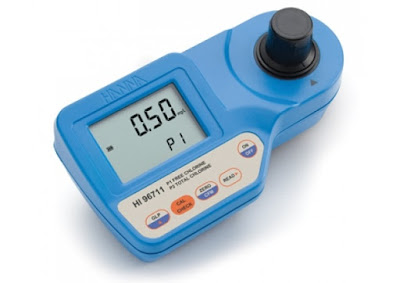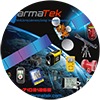HANNA HI 96711 Free and Total Chlorine Photometer
- CAL CHECK™
- User calibration
- Certified calibration and verification standards
- BEPS (Battery Error Prevention System)
- TIMER function
- Auto shut-off
- GLP Features
This meter uses an exclusive positive-locking system to ensure that the cuvette is in the same place every time it is placed into the measurement cell.
Chlorine is integrated into water supplies in it’s molecular form for the purpose of destroying unwanted microorganisms. Once introduced to the water, chlorine will form into three different forms; free chlorine, hypochlorous acid, and hypochlorous ions. Free chlorine will combine itself with ammonia and nitrogen compounds, creating combined chlorine. When chlorine and ammonia combine, it creates chloramines (monochloramine, dichloramine, and nitrogen trichloride. Proper testing should be administered when chlorinating any water supply, as potentially harmful compounds such as chloroform may be formed. N, N-diethyl-p-phenylenediamine (DPD) as well as other methods are available for measuring total residual chlorine.
Order Information:
HI 96711 is supplied with sample cuvettes with caps (2), 9V battery and instruction manual.
HI 96711C includes photometer, sample cuvettes with caps (2 ea.), 9V battery, scissors, cloth for wiping cuvettes, instrument quality certificate, instruction manual and rigid carrying case.
Specifications
|
Range |
Free Chlorine |
0.00 to 5.00 mg/L |
|
Range |
Total Chlorine |
0.00 to 5.00 mg/L |
|
Resolution |
|
0.01 mg/L from 0.00 to 3.50 mg/L; 0.10 mg/L above 3.50 mg/L |
|
Accuracy |
|
±0.03 mg/L ±3% of reading @ 25°C |
|
Light Source |
|
Tungsten lamp |
|
Light Detection |
|
Silicon Photocell |
|
Power Supply |
|
9V battery; auto-off: after ten minutes of non-use in measurement
mode; after one hour of non-use in calibration mode; with last reading
reminder |
|
Environment |
|
0 to 50°C (32 to 122°F); RH max 95% non-condensing |
|
Dimensions |
|
192 x 104 x 69 mm (7.6 x 4.1 x 2.7") |
|
Weight |
|
360 g (12.7 oz.) |
|
Method |
|
adaptation of the USEPA method 330.5 and Standard Method 4500-Cl G |






















0 komentar:
Posting Komentar